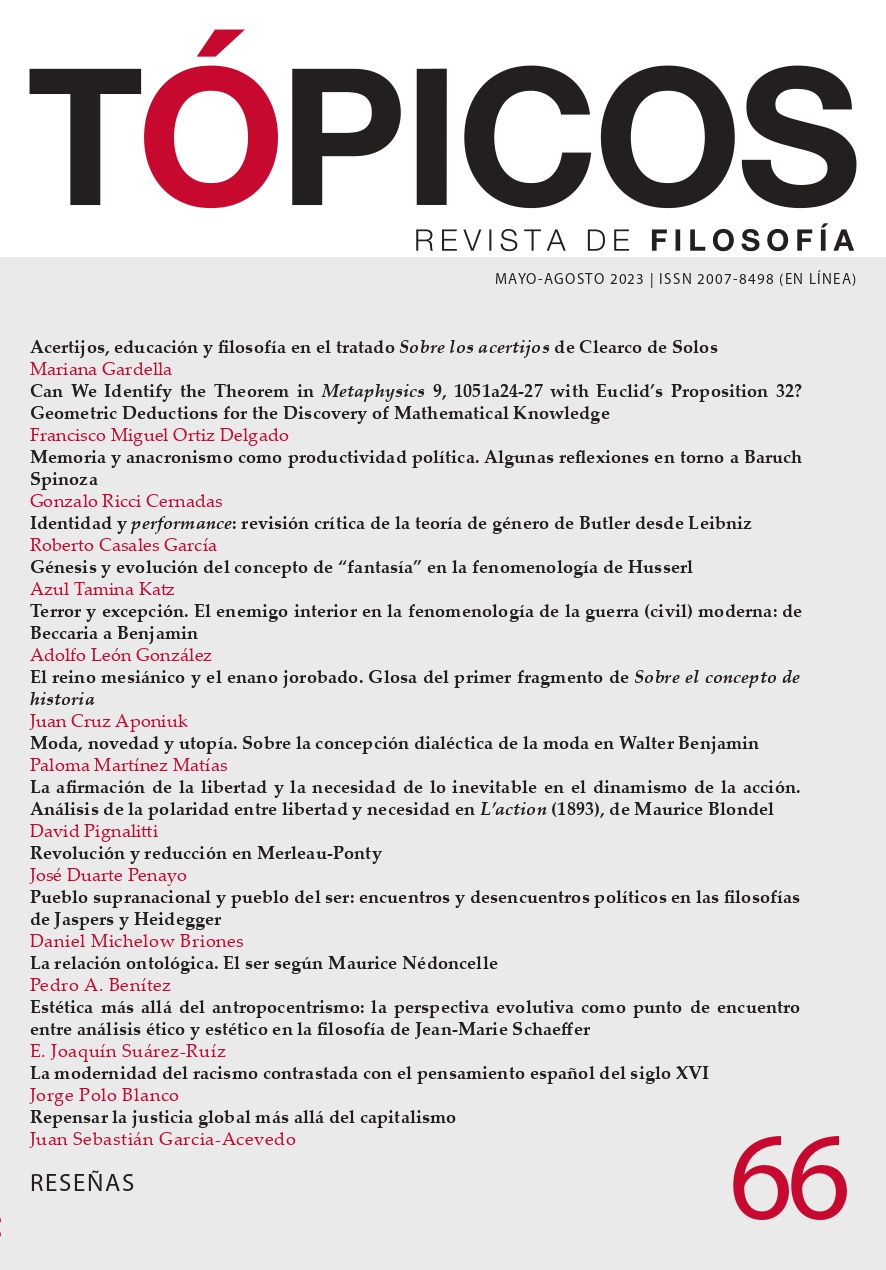Terror and Exception. The Inner Enemy in the Phenomenology of Modern (Civil) War: From Beccaria to Benjamin
Published 2023-04-11
Keywords
- violence,
- W. Benjamin,
- death penalty,
- state of exception,
- political police
- terrorism ...More
Copyright (c) 2023 Tópicos, Revista de Filosofía

This work is licensed under a Creative Commons Attribution-NonCommercial-NoDerivatives 4.0 International License.
How to Cite
Abstract
Since the 19th century, a permanent state of alarm against terrorism in modern liberal democracies has allowed the coexistence of apparent socio-legal normality and the state of exception, the space in which the law is suspended to protect itself from a threat to its power. The current means of police and espionage typical of modern anti-terrorist warfare serve to test Benjamin’s hypothesis that the state must always resort to a higher level of authority and legality, for it is impossible to defend its order within the framework of the law itself. This article analyzes the concepts of violence and exception in Benjamin in depth based on the ideas about the death penalty and state police developed in his essay “The Critique of Violence”, put into dialogue with the ideas of authors such as Beccaria, Schmitt, Agamben, and Honneth.
References
- Agamben, G. (2004). Estado de excepción. Homo sacer II. A. Gimeno (trad.). Pre-Textos.
- Arendt, H. (2005). Sobre la violencia. G. Solana (trad.). Alianza.
- Aristóteles. (1873). Política. P. de Azcárate (trad.). Medina y Navarro Editores. URL: http://www.filosofia.org/cla/ari/azc03.htm.
- Balibar, É. ([1996] 2005). Violence : idéalité et cruauté. En F. Héritier (ed.), De la violence. I. (pp. 55-88). Odile Jacob.
- Beccaria, C. (1822). Tratado de los delitos y las penas. C. Y. (trad.). Imprenta de Albán. URL: http://cdigital.dgb.uanl.mx/la/1080097388/1080097388_MA.PDF
- Benjamin, W. (1989). Tesis de filosofía de la historia. En W. Benjamin, Discursos Interrumpidos. I (pp. 175-191). J. Aguirre (trad.). Taurus.
- Benjamin, W. ([1921] 2001). Para una crítica de la violencia y otros ensayos. R. Blatt (trad.). Aguilar-Altea-Tauros-Alfaguara.
- Bock, W. (2019). Medios para una política futura: "Para una crítica de la violencia" de Walter Benjamin. Bajo Palabra, 2(21), 359-382. DOI: http://doi.org/10.15366/bp2019.21.020.
- Butler, J. (2006). Critique, Coercion and Sacred Life in Benjamin’s “Critique of Violence”. En H. de Vries y L. E. Sullivan (eds.), Political Theologies: Public Religions in a Post-Secular World. (pp. 201-219). Fordham University Press.
- Deflem, M. (2005). Wild Beast without Nationality: The Uncertain Origins of Interpol, 1898-1910. En P. Reichel (ed.), The Handbook of Transnational Crime and Justice. (pp. 275-285). Sage Publications.
- Derrida, J. (1994). Force de loi. Le "fondement mystique de l'autorité". Galilée.
- Gerstenberger, H. (1995). La violence dans l'histoire de l'État, ou la puissance de définir. Lignes, 2(25), 23-33. DOI : https://doi.org/10.3917/lignes0.025.0023.
- Honneth, A. (2009). Patologías de la razón. Historia y actualidad de la Teoría Crítica. G. Mársico (trad.). Katz.
- Huxley, A. ([1932] 2004). Un mundo feliz. R. Hernández (trad.). Random House Mondadori.
- Jensen, R. B. (1981). The International Anti-Anarchist Conference of 1898 and the Origins of Interpol. Journal of Contemporary History, 16(2), 323-347. URL: https://doi.org/10.1177/002200948101600205.
- Liang, H.-H. (1992). The Rise of the Modern Police and the European State System from Metternich to the Second Wolrd War. Cambridge University Press.
- Martel, J. R. (2015). The Anarchist Life We Are Already Living : Benjamin and Agamben on Bare Life and the Resistance to Sovereignty. En B. Moran y C. Salzani (eds.), Towards the Critique of Violence: Walter Benjamin and Giorgio Agamben. (pp. 187-200). Bloomsbury.
- Orwell, G. (1980). 1984. R. Velasquez (trad.). Salvat.
- Parsons, L. E. (1914). Twenty-Fifth Anniversary Eleventh of November Memorial Meeting. Lucy E. Parsons. URL: https://archive.org/details/twentyfifthanniv00lawr.
- Platón. (1872). La República o de lo justo. En Obras completas de Platón. Tomo 7. P. de Azcárate (trad.). Medina y Navarro. URL: http://www.filosofia.org/cla/pla/img/azf07239.pdf.
- Ross, A. (2015). The Ambiguity of Ambiguity in Benjamin's ‘Critique of Violence’. En B. Moran y C. Salzani (eds.), Towards the Critique of Violence: Walter Benjamin and Giorgio Agamben. (pp. 39-56). Bloomsbury.
- Schmitt, C. (1984). Teoría del partisano. Notas complementarias al concepto de lo político. En C. Schmitt, El concepto de lo político. J. Aricó (trad.). (pp. 113-188). Folios.
- Schmitt, C. (1985). La dictadura. Desde los comienzos del pensamiento moderno de la soberanía hasta la lucha de clases proletaria. J. Díaz (trad.). Alianza.
- Schmitt, C. (1988). Théologie politique. J. L. Schlegel (trad.). Gallimard.
- Schmitt, C. (2009). El concepto de lo político. R. Agapito (trad.). Alianza.
- Shklar, J. N. (1989). The Liberalism of Fear. En N. L. Rosenblum (ed.), Liberalism and the Moral Life. (pp. 21-38). Harvard University Press.
- Someoddstuff. (2011, 28 de septiembre). Aldous Huxley interviewed by Mike Wallace : 1958 (Full). [Video]. YouTube. URL: https://www.youtube.com/watch?v=alasBxZsb40&ab_channel=someoddstuff.
- Sorel, G. ([1906] 2005). Reflexiones sobre la violencia. F. Trapero (trad.). Alianza.
- Stoppard, T. (2013, 10 de Diciembre). State Surveillance of Personal Data: What Is the Society We Wish to Protect? The Guardian. URL: https://www.theguardian.com/world/2013/dec/10/state-surveillance-data-tom-stoppard.
- Taubes, J. (1999). La théologie politique de Paul. Seuil.
- Trinquier, R. (1961). La guerre moderne. La Table Ronde.
- Valencia Tovar, Á. (1988). Ante la cruda realidad. Revista de las Fuerzas Armadas, 127, 212.
- Walzer, M. (2001). Guerras justas e injustas. Un razonamiento moral con ejemplos históricos. T. Fernández y B. Eguibar (trad.). Paidós.





